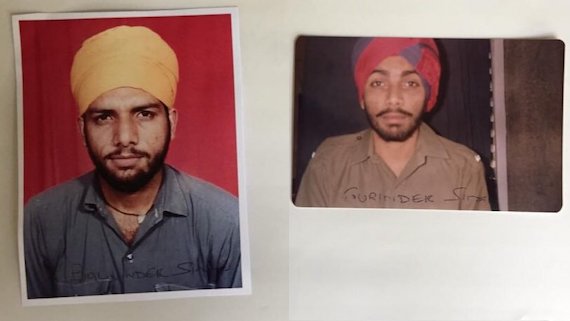Mohali/SAS Nagar: A CBI special court of Judge Nirbhow Singh Gill has convicted two Punjab police officers for their role in the abduction and disappearance of Gurinder Singh in 1993.
This was the second of two cases in which the same police officer Inspector Joginder Singh had earlier been convicted for the abduction and kidnapping of of the victim’s brother Balwinder Singh in 2013.
Bibi Nirmal Kaur holding photographs of her family members who were killed during enforced disappearance by police force
The sole surviving member of the family Nirmal Kaur, the sister-in-law of Gurinder Singh and wife of Balwinder Singh is shattered by the verdict. “We will be appealing this decision in the Punjab & Haryana High Court. How can the same police officer responsible for the abduction and killing of two members of my family, who have not been seen or heard from since 1993 (26 years) be given a sentence of only six years and for a much lesser charge, when the CBI had proved that these were cases of abduction and murder. The other officer just got probation. The Judge declined to award compensation. This is a mockery.” In both cases, the concocted story of them having “escaped” was disproved.
The verdict is the latest struggle of Nirmal Kaur. Her father-in-law, Dharam Singh, had died waiting for justice in the two and half decades it took the court to reach this verdict and had desperately written to the President of India in 2007. “My mother-in-law, Charan Kaur passed away three months ago. Both had agonisingly waited for justice to be done in this case. Even now our hopes have been cruelly dashed,” she said.
Nirmal Kaur’s long and torturous battle for justice continues. “They should get the sentence they deserve and suffer the way I have for the last 26 years”. These offences were committed during the counter-insurgency period in which gross human rights abuses were committed by the Punjab police and security services.
“Life sentences could have been awarded under section 364 (abduction with intent to murder) however the Judge convicted under the lesser section of abduction and kidnapping. These are actually enforced disappearance cases which are classed as crimes against humanity under international law and amongst the most serious and heinous of crimes committed by law enforcement officials. Of course we will be appealing this to the High Court and expect the CBI to do the same ” said Satnam Singh Bains, advocate for the family.
CRIMES AGAINST HUMANITY IN PUNJAB:
The period of 1980s-90s in Punjab was marred by widespread and systematic wide-spread and systematic human rights abuses by Punjab police and other Indian forces. Enforced disappearances, custodial torture and death, fake encounters were common policing practice during that period. [for more details see:- Death Silence: The Legacy of Human Rights Abuses in Punjab (by Human Rights Watch); Protecting the Killers: A Policy of Impunity in Punjab, India (by Ensaaf and Human Rights Watch); Reduced to Ashes: The Insurgency and Human Rights in Punjab (by CCDP); Smoldering Embers, (by Voices for Freedom)].
Punjab police had unleashed the region of state terror against civilian Sikh population of Punjab during this.
Thousands of Sikhs, mostly youth, were eliminated by Indian forces during 1980s-90s. The black deeds of Punjab police also find mention in US diplomatic cables leaked by Wikileaks.
POLICY OF IMPUNITY:
The culprits of crimes against humanity have escaped the due process of law as a result of impunity policy of the Indian state. Accused cops have enjoyed political patronage and they were awarded with promotions and high ranks. A large number of cases of crimes against humanity went unrecorded and unaccounted. Only a few cases were registered but in those cases too, inordinate delay in legal process has resulted in grave injustice.
CBI COURT TRYING MORE THAN 2 DECADES OLD CASES:
In Mohali, Special CBI courts are trying some of the cases related to crimes against humanity committed by Punjab police officials. Most of the incidents date back to late 1980s or early 1990s. These are few cases that were handed over to the CBI for investigation. The CBI had completed its investigation in late 1990s and cases were registered against accused cops. The trial process had remained stayed by the Supreme Court of India for 14 years. The SCI had imposed stay on trial back in 2002 and the apex court of India took 14 years to decide a petty technical issue. The stay was lifted in 2016.
It may be recalled here that “Genocide” and “Crimes Against Humanity” are not defined or punished as crimes under the Indian law and trial are taking place for offences under the Indian Penal Code.

